|
Pivotal World Series Plays
Carbo Brings Red Sox Back from the Dead
1975 World Series Game Six: Cincinnati Reds @ Boston Red Sox
The Reds led the Series three games to two and led Game Six 6-3 in the top of the 8th. So Cincinnati manager Sparky Anderson did something he rarely did. He let reliever Pedro Borbon bat for himself. Southpaw Roger Moret had just replaced Sox starter Luis Tiant after Cesar Geronimo belted a solo homer. Sparky figured he would hold off on using his two young relievers, lefty Will McEnaney and righty Rawly Eastwick, although they both were throwing in the Reds pen. Moret set down the three batters he faced to stop the bleeding. As the Sox trotted in, the crowd tried to inspire them, but their cheers were lukewarm at best. You couldn't blame a fan base that hadn't enjoyed a World Series victory since 1918 for feeling that fate had dealt them a losing hand yet again. Borbon began his third inning of work facing CF Fred Lynn. Pedro started him with his best pitch, a fast sinker, but the American League Rookie of the Year drilled it back to the box where it caromed off Borbon's right shin to the 3B foul line. That brought 3B Rico Petrocelli to the plate. Contemplating retirement, the 11-year veteran knew that this might be the last at-bat of his career. The crowd encouraged one of their favorites with chants of "Rico, Rico, Rico!" Petro fought back from a 1-2 hole to work the count full. In the Cincy dugout, Anderson was pacing, hands in his back pocket. He had taken a chance by not pinch-hitting for Borbon and almost couldn't bring himself to watch. After fouling off two deliveries, Rico took a high pitch to put runners on first and second. 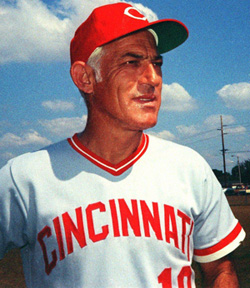 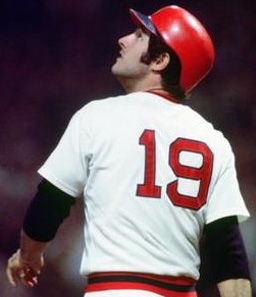 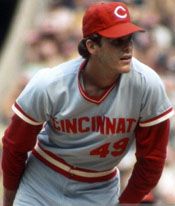 L-R: Sparky Anderson, Fred Lynn, Rawly Eastwick Eastwick pitched with complete confidence. "I never have a negative thought," he proclaimed. "This radiates to the hitter. He can feel it when you know you're going to get him out."
Evans had hit a game-tying homer off Eastwick in Game Three, but this time he went down swinging as the fans groaned.In the Red Sox dugout, manager Darrell Johnson told reserve outfielders Bernie Carbo and Juan Beniquez to each grab a bat. He ordered the left-hand hitting Carbo to the on-deck circle to pinch hit for Moret if #8 hitter, SS Rick Burleson, didn't hit into a double play. If Anderson played the percentage, as Johnson expected, Sparky would bring in McEnaney to face Carbo, at which point the Bosox skipper would switch to Beniquez, a right-hander. Since the fifth inning, Carbo had been swinging a weighted back and stretching in the clubhouse. The pinch hitting specialist had homered in Game Three off another righthanded reliever, Clay Carroll.
Bernie didn't expect to hit because he assumed Anderson would bring in southpaw McEnaney. Surely Sparky would not repeat his mistake of Game Three when he let Carroll pitch to Carbo. 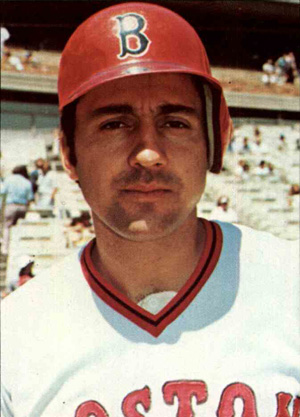 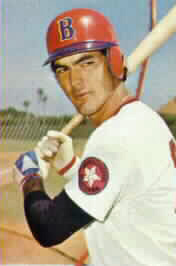 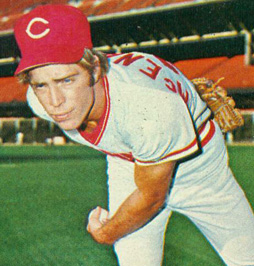 L-R: Rico Petrocelli, Dwight Evans, Will McEnaney "Pinch-hitting for Moret: Bernie Carbo," barked the Fenway Park PA. Carbo hesitated in the on-deck circle, expecting Anderson to pop out of the dugout at any moment. He waited so long that home plate umpire Satch Davidson told him, 'Come on, get in here. Time to hit!" When Bernie stepped into the batter's box, he told his former teammate, C Johnny Bench, "Wow! I'm gonna hit." Anderson didn't come out because he decided that right-handed pull hitter Beniquez might hit one off or over the Green Monster against southpaw McEnaney.
Carbo had been the #1 draft pick of the Reds in 1965, one round ahead of Bench. While languishing in the minor leagues, Bernie struggled to overcome short attention span and the effects of a dysfunctional home headed by an abusive, alcoholic father. A fun-loving kid on the outside, the young prospect had a bad temper and had been an alcoholic himself by the age of 16. He played for Sparky Anderson in AAA and came to regard him as a father. Carbo credited Sparky with helping him to grow up as well as coaching him to become a better ballplayer.
Carbo made the Reds during Sparky's first year at the helm. He hit .310 with 21 HRs and 63 RBIs to earn the Sporting News NL Rookie of the Year Award. But it went downhill from there, starting with a holdout the following spring that failed and caused him to finally report out of shape mentally and physically. He went berserk when GM Bob Howsam refused to renegotiate his contract. Bernie began to beat and choke Howsam until others yanked him away. Carbo was shipped to St. Louis, where he had two so-so years. The Cards then traded him to the Red Sox in 1974. Bernie fit in much better in Boston's looser clubhouse than he had wtchers Bill Lee and Rick Wise (another ex-Card) in keeping the Sox relaxed down tith the regimented Reds and Cardinals. He joined kindred free spirits like pihe stretch. Carbo hit 15 HRs and drove home 50 runs as a backup outfielder and pinch-hitter. Bernie sought out Anderson before the first game of the Series. He apologized for his terrible behavior that cut short his career with Cincinnati and thanked him for everything he did for him. 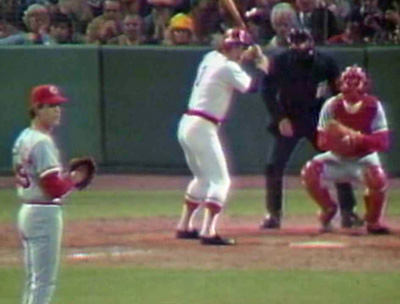 Eastwick vs Carbo First pitch: Moving fastball on the outside corner. Strike one. Second pitch: Low and inside. 1-1 Reds 2B Joe Morgan waved his outfielders to move back. Third pitch: Another smoking fastball that handcuffed the hitter but was just off the inside corner. 2-1 Fourth pitch: Bench called for a cutter on the outside corner. Rawly uncorked his best pitch of the evening. Carbo swung hard but missed the ball by a foot. Watching from 1B, Petrocelli winced. There was no way, he thought, that Carbo would catch up with Eastwick's fastball.
Anderson moved up to the top step of his dugout, hands thrust deep in his pockets again, watching Carbo closely. He recalled that "Bernardo," as he called him, had always been a dangerous hitter with two strikes. The voice inside Sparky that he trusted told him to bring in McEnaney. But he stayed put.Fifth pitch: Late again, Carbo got his bat on a low, outside fastball, fouling it into the stands down the 3B line. Anderson's voice said, Make the change. McEnaney will strike him out. But Eastwick was dominating the hitter. I'll give him one more pitch. Sixth pitch: Rawly delivered a nasty cutter that dove for the inside corner, right at the hitter's hands. At the last second, Bernie chopped down at the ball, nicking it just before it landed in Bench's glove. The swing was so late that Umpire Davidson started to call "Ball three!," then changed to "Foul ball!" Carbo stepped out of the box to catch his breath. I just took the worst swing in the history of baseball, he thought. 3B Coach Don Zimmer thought, That was one of the worst swings I've ever seen. Bernie looked like a Little Leaguer.
Seventh pitch:
Bernie figured that his former minor- and major-league teammate Bench would now call for a fastball away. And that's what Eastwick threw but belt-high with no movement, right over the middle of the plate. Bernie drove the mediocre pitch high and deep into RCF. He started sprinting down the line, watching CF Geronimo turn his back to watch the ball soar over the wall and land in the tenth row for a two-out, three-run pinch-homer to tie the game.The two baserunners, Lynn and Petrocelli, tried to remain optimistic. Carbo's swing looked worse with each succeeding pitch. In the NBC-TV booth, analyst Tony Kubek expressed a more optimistic view. Bernie had fought off a nasty pitch and protected the plate to stay alive. Amid the loudest explosion of noise longtime Red Sox owner Tom Yawkey had ever heard, Bernie raced around the bases in a trance. Hands on hips, Eastwick started out to RCF in disbelief. As Carbo rounded third, he called to Pete Rose, "Don't you wish you were this strong, Pete? Ain't this fun?" Rose couldn't help but smile. "Yeah, this is fun, Bernie." Lynn and Petrocelli greeted the conquering hero at home plate and escorted him to the dugout as Bernie thrust his fists into the air in triumph. His teammates swarmed him as he entered the dugout. In the other dugout, Anderson chastised himself for not listening to the voice. The game remained tied until the bottom of the 12th when Carlton Fisk hit one of the most memorable home runs in baseball history to force Game 7. Fisk is rightly enshrined in the Hall of Red Sox Heroes. But without Carbo, the Sox lose in six and, who knows?, Fisk might not have made the Hall of Fame. 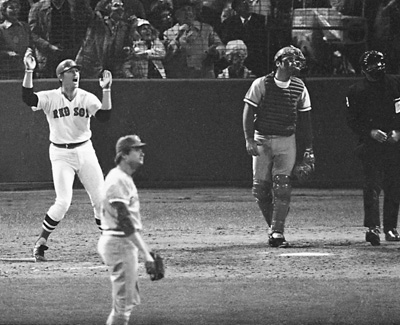 Fisk coaxes his 12th inning home run to stay fair. Reference: Game Six: Cincinnati, Boston, and the 1975 World Series: The Triumph of America's Pastime, Mark Frost (2009)
|